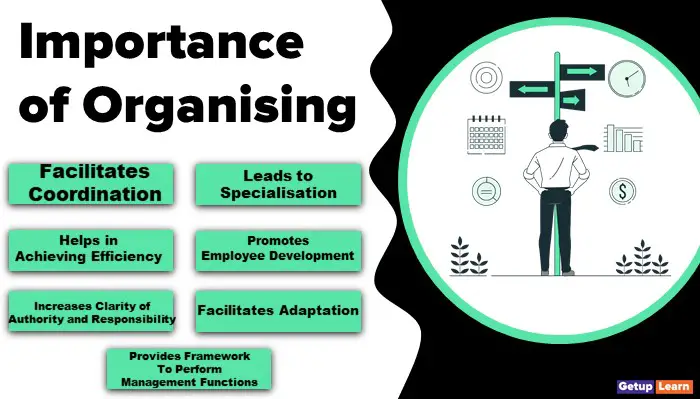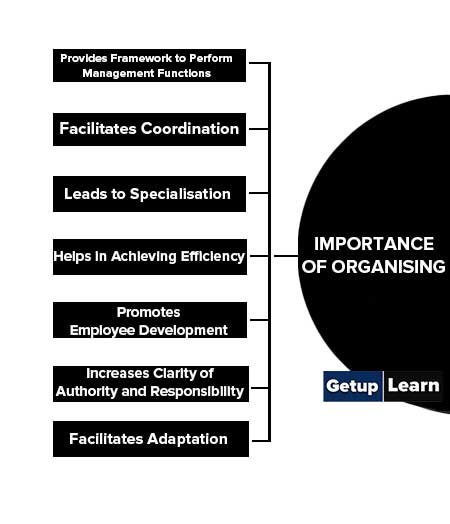Table of Contents
Importance of Organising
The organising process creates a network of roles and relationships and provides a framework within which each employee performs the activities that have been assigned to him. His role becomes more meaningful and he contributes effectively to achieve pre-determined objectives.

Therefore, organising is regarded as a mechanism or means to achieve planned objectives. These are the importance of organising:
- Provides Framework to Perform Management Functions
- Facilitates Coordination
- Leads to Specialisation
- Helps in Achieving Efficiency
- Promotes Employee Development
- Increases Clarity of Authority and Responsibility
- Facilitates Adaptation

Provides Framework to Perform Management Functions
Organisational structure provides a framework within which various management functions can be performed by the managers more efficiently.
It is only through the relationship of superior and subordinate, which is created by the organising process that the manager plans, directs and controls the activities of his subordinates.
Facilitates Coordination
The organising process may also be used as a device for maintaining and achieving coordination. In organising, the activities performed by an individual employee are related to the functioning of his department, and then the functioning of various departments is harmonised for seeking common goals.
Leads to Specialisation
Organising is based on the concept of division of work that ultimately leads to specialisation. Through it, activities are divided, grouped up and assigned to the concerned department having requisite competence, and resources and the department develops as a specialised centre for those activities.
Helps in Achieving Efficiency
The organising process aims at achieving higher efficiency because it helps in making efficient utilisation of both human as well as physical resources.
Promotes Employee Development
In a highly decentralised organisational structure, each position is strengthened by delegating the required authority. As a result of it, each manager makes decisions, solves problems and tackles the situation that ultimately leads to overall development in his personality.
Division of work and delegation of authority among employees, through the process of organising, gives them a precise idea of what they are expected to perform and within what limits of authority they have to perform. It helps in boosting an employee’s morale and he feels comfortable in the work setting.
Facilitates Adaptation
Organisational structure also provides a useful means to cope with changing environment. In the event of a change, necessary modifications may be made in the organising process, organisational structure and organisational goals, so as to bring them in conformity with the change.
It may be done by maintaining flexibility in the structure and making it adaptive to changes.
What is the importance of organising?
The following is the importance of organising:
1. Provides Framework to Perform Management Functions
2. Facilitates Coordination
3. Leads to Specialisation
4. Helps in Achieving Efficiency
5. Promotes Employee Development
6. Increases Clarity of Authority and Responsibility
7. Facilitates Adaptation.













